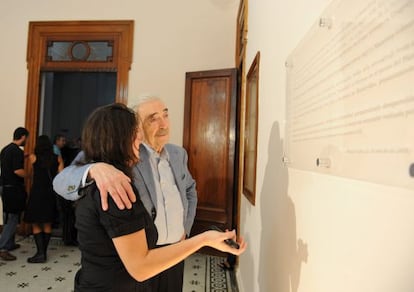Uruguay accepts responsibility in Dirty War death of poet’s daughter
Formal recognition of responsibility in compliance with Inter-American Human Rights Court ruling Leftist activist María Claudia was murdered after giving birth to a girl at a military hospital

Uruguayan President José Mujica last week formally accepted his country’s responsibility for the death of an Argentinean woman during the 1970s Dirty War, a case that had drawn international attention.
The formal recognition of responsibility, Mujica says, is in compliance with a ruling issued by the Inter-American Human Rights Court (IAHRC) in the case of María Claudia García, the daughter-in-law of Argentinean poet Juan Gelman, who won the Cervantes Prize in 2007. Gelman and his granddaughter, Macarena — María Claudia’s daughter — attended the March 21 ceremony held in Congress in Montevideo where a plaque was unveiled in memory of María Claudia and other victims of state terrorism.
María Claudia and her husband Marcelo were kidnapped on August 24, 1976 in Argentina. While pregnant, María Claudia, a leftist activist, was taken across the border where she was murdered after giving birth to a girl at a military hospital. The daughter, who was reared by another family, didn’t discover her true identity until 2000.
Last year, the IAHRC ordered the Uruguayan government to issue the recognition. For years, Gelman and his family have been trying to locate the remains of María Claudia.
In an interview with the Buenos Aires daily Página/12 on Sunday, Gelman said that he had been told his daughter was secretly buried in the Uruguayan military’s Battalion 14 headquarters, where forensic experts are now discovering remains of Dirty War victims.
Five people have been charged with María Claudia’s murder in Argentina, but all are being held in Uruguayan jails on other charges. “There is an extradition request by Argentina but I suspect there is some type of maneuver to keep from extraditing them because of Argentina’s rigorous [prosecution of Dirty War suspects],” Gelman said.
Over the past two years, Uruguayan lawmakers have been fiercely debating whether to revoke an amnesty law that protects former military officers from being prosecuted.
“The Gelman case is a milestone in the pursuit of truth and justice in Uruguay regarding the serious human rights violations that occurred during the dictatorships in South America,” said Viviana Krsticevic, executive director of the Washington-based Center for Justice and International Law, which litigated the case before the IACHR on behalf of Gelman and Macarena.
Tu suscripción se está usando en otro dispositivo
¿Quieres añadir otro usuario a tu suscripción?
Si continúas leyendo en este dispositivo, no se podrá leer en el otro.
FlechaTu suscripción se está usando en otro dispositivo y solo puedes acceder a EL PAÍS desde un dispositivo a la vez.
Si quieres compartir tu cuenta, cambia tu suscripción a la modalidad Premium, así podrás añadir otro usuario. Cada uno accederá con su propia cuenta de email, lo que os permitirá personalizar vuestra experiencia en EL PAÍS.
¿Tienes una suscripción de empresa? Accede aquí para contratar más cuentas.
En el caso de no saber quién está usando tu cuenta, te recomendamos cambiar tu contraseña aquí.
Si decides continuar compartiendo tu cuenta, este mensaje se mostrará en tu dispositivo y en el de la otra persona que está usando tu cuenta de forma indefinida, afectando a tu experiencia de lectura. Puedes consultar aquí los términos y condiciones de la suscripción digital.








































